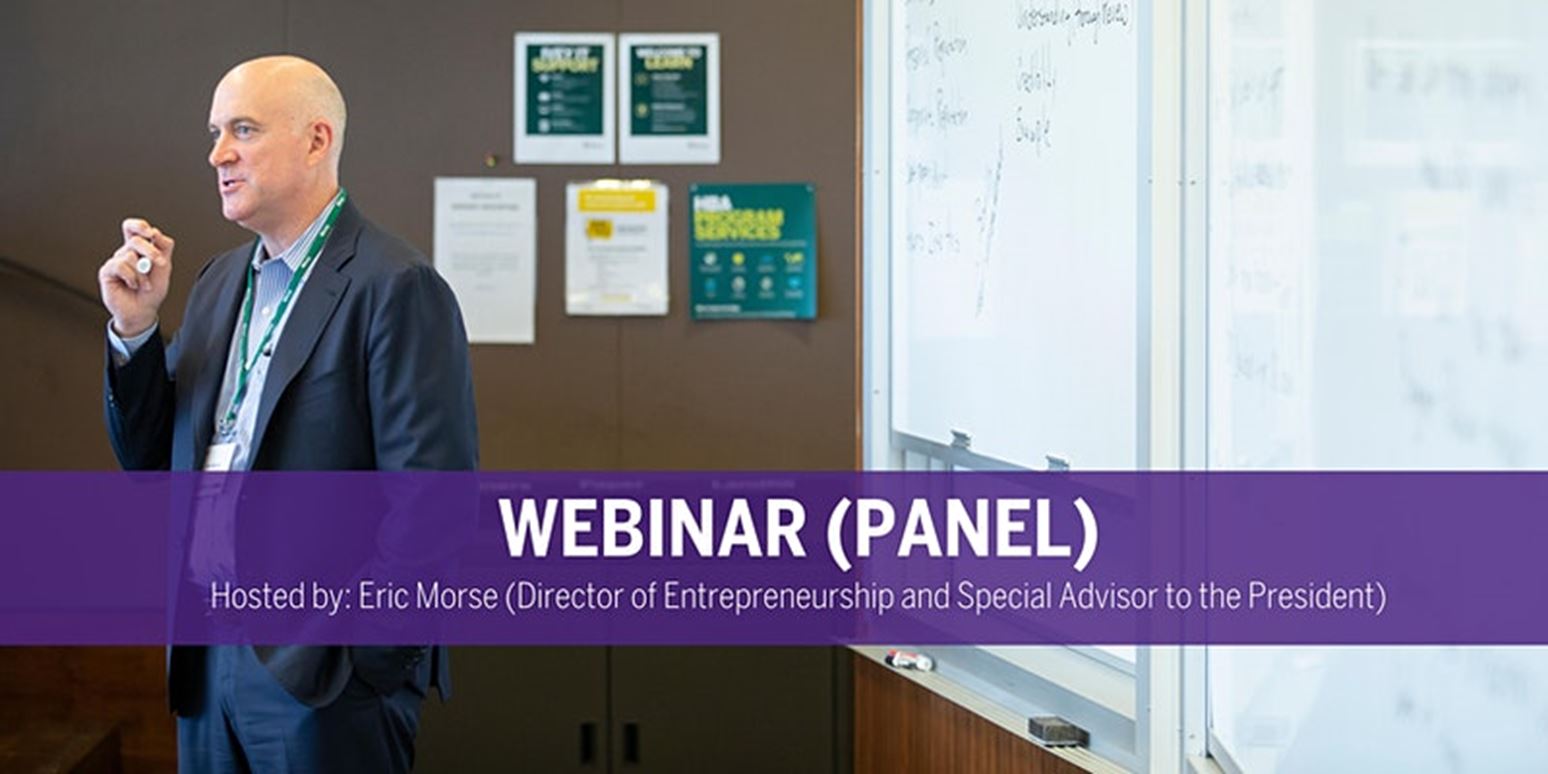The ability to adapt, and be agile are hallmarks of entrepreneurship. With the unprecedented levels of disruption caused by the coronavirus pandemic, the ability to change course and find new opportunities has been essential to entrepreneurs' survival.
Ivey Professor and Executive Director of the Morrissette Institute for Entrepreneurship Eric Morse hosted three Western alumni entrepreneurs to explore how they pivoted their businesses - and in some cases their entire business model - to find new ways of creating value and solving pain points in a coronavirus world.
The panel included:
- Geoff Dillon, BSc ’10, Founder of Dillon's Small Batch Distillers. Dillon converted his distillery into a full-time hand sanitizer production facility to supply Ontarians and front-line health-care workers with sanitizer;
- Jenessa Olson, MSc '18, BA '14, Co-Founder of Clearzone and STMNT. Olson’s first company, STMNT, was a clothing rental venture that was on the heels of signing a major deal with a large Canadian retailer. When coronavirus hit, their ‘share’ industry stopped existing. Their pivot involved the use of Ozone to sanitize workspaces, the same technology they had used to clean rental clothes at STMNT;
- Larry Lau, MBA '18, BA '09, Co-Founder of TakeCare Supply and Eighty8 Ventures.
Lau was approached by his business partner, Kevin Vuong, BA ’11, and mimiTENS owner Anna-Maria Mountfort, to start producing made-in-Canada, reusable cloth masks for non-health workers.
Key learnings from the session
Being Decisive - Each entrepreneur needed to make a decision, act fast, and learn quickly. For Olson, firstly, it was about accepting that their original business model was not coming back anytime soon. When they settled on a new venture, interests in other cities quickly opened the door to a franchising opportunity. Reaching out to her network, she quickly learned the intricacies of the franchise model.
Leverage Your Network - Each pivot depended greatly on the power of the network and relationships that each entrepreneur had invested in. For Dillion, when their efforts to supply sanitizer ran into alcohol shortages, wineries and breweries in the region donated tankers of unused old wine. Additionally, over 30 different wineries gave them bottles, caps, and label rolls to continue production.
“Never minimize your experiences. The connections that you’ve made and skills gained …can [always] help you in your next venture, or next job,” said Lau, who elaborates.
“If I didn’t make the investment to build out this warehouse, we wouldn’t have been able to pull this off. If I didn’t invest into the relationship I have with [my cofounder] Kevin, and him with [our other co-founder] Anna-Maria, we wouldn’t have been able to come together to do this.”
Meeting the Leadership Challenge - Leadership is tested and revealed during trying times, and leaders across industries are under intense amounts of stress. Under this spotlight, leaders must continue to make good decisions, find ways to motivate their employees, and keep them healthy while operating in lockdown.
Dealing with Government Bureaucracy while Pivoting - Each of our entrepreneurs dealt with red tape when it came to their pivots. From Dillon’s perspective, this has always been a challenge in the craft spirit world. However, he did notice a shift in the government process due to COVID-19.
“There has always been lots of licensing. Normally, it would take a year to get a natural product number (NPN) on your bottle... But it’s the first time I’ve ever seen the government switch stuff around so quickly... After we released our product for free the first week, Health Canada released a new procedure. And within two weeks, we had our natural product number.”
However, every industry is different, as Olson pointed out. “Keeping track of the trends, and really having a pulse on what’s happening in your specific market, will be extremely beneficial, and your best bet”.
“It’s not pivoting to take advantage of the crisis, it’s more about survival,” stated Lau.
From adapting their retail operations to completing shaking up their business models, the panelists understood that pivoting quickly was necessary for their businesses’ survival, and the past few months have been a rollercoaster of emotion.
“The Monday before we released our hand sanitizer, I had to lay off half of my staff... But by the end of the week, we had all our staff back, and we’ve had to hire more people since then... It was just a total opportunity,” said Dillon. “I feel so fortunate to be in this position and to have had that opportunity to both help people and be successful at the business.”
Morse wrapped up the session stressing the importance of innovation, another key ingredient of any successful entrepreneur:
“When you start to think hard about ‘where your customers were three months ago’ and ‘where they’re going to be 3 months from now’, that’s probably a very different place. If you’re not changing to keep up with where your customers are going to be, or where your suppliers are going to be, you can find yourself in a difficult situation… You’re going to have to meet them where they’re going to be in the future. And that’s going to take innovation to do that.”
The full webinar was broadcasted on Facebook Live. Watch the full session here.
